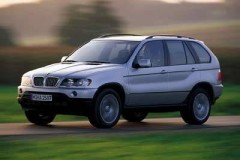BMW X5 2000 4.4i (E53)
BMW X5 2000 4.4 petrol description
BMW X5 2000 4.4i has been produced from May, 2000 to October, 2003. It has eight-cylinder petrol engine with displacement of 4.4 litres, which produces power of 286 horsepower on 5400 rpm and torque 440 Nm (Newton metres) on 3600 revolutions per minute.
This 8-cylinder 32-valve engine camshaft is driven by chain (What is an engine chain and belt? ). Engine has fuel injection system, this is an atmospheric engine (without turbine). The engine meets the Euro 3 emissions standard. Engine lifespan (mileage before major repairs or overhaul) can last from 290 up to 490 thousand kilometres. Remember that engine life depends on regular maintenance and the quality of the materials used (oils, fuels, etc.).
More engine specs
This BMW X5 4.4 engine oil type is 5W-30 and oil capacity is 7.5 litres.
BMW X5 2000 4.4i has all four wheel drive (AWD, 4x4) and automatic gearbox with 5 gears.
BMW X5 2000 4.4i accelerates to speed 100 kilometres per hour in 7.5 seconds. The maximum speed of this car is 207 km/h.
BMW X5 2000 4.4i fuel consumption is 14 litres per 100km in combined city/highway mode (7.1 km/l), fuel consumption in city - 19 l/100km, highway fuel economy - 11 l/100km. Fuel tank capacity is 93 litres or 24.57 gallons, which gives a mileage up to 660 kilometers without refueling in urban cycle and even up to 840 kilometers on highway.
According to user reviews, this BMW real everyday fuel consumption is 14.9 litres per 100 km, which is 6% more than the manufacturer's stated. More - Real BMW X5 fuel consumption.

BMW X5 2000 4.4i technical data
| Model: | BMW X5 4.4i | ||
|---|---|---|---|
| Body style: | Crossover / SUV | ||
| Production period: | 2000. May ... 2003. October | ||
| Engine: | 4398 cm3 Petrol, 8 cylinders | CO2 emissions: | 335 g/km |
| Power: | 286 HP ON 5400 RPM | Torque: | 440 NM ON 3600 RPM |
| Gearbox: | Automatic gearbox (5 gears) | Drive type: | All wheel drive (AWD, 4x4) |
| Top speed: | 207 km/h | Acceleration 0-100 km/h: | 7.5 seconds |
| Fuel consumption (l/100km): | 14.0 (combined) 19.0 (urban) 11.0 (highway) | ||
| Real fuel consumption: | 14.9 l/100km (15.8 MPG) by user reviews from various sources | ||
| Fuel tank capacity: | 93 litres (24.6 gallons) | ||
| Car dimensions: | 4.67m (length) 1.87m (width) 1.71m (height) | ||
| Turning diameter: | 12 meters | ||
| Ground clearance: | 187 mm (approximate, with standard suspension, unladen vehicle) | ||
| Seats: | 5 seats | ||
| Trunk capacity: | 465 litres | ||
| Trunk max capacity: | 1550 litres (with rear seats folded down) | ||
| Gross weight: | 2650 kg | ||
BMW X5 2000 4.4i engine M62B44TU
Engine reliability:
Overall, this engine can last around 290,000 to 490,000 km if properly maintained, using the correct quality oil and fuel, and carrying out regular checks and maintenance.The engine has hydraulic valve tappets (lifters), which provide quieter operation and do not require periodic adjustment, but are more complex in design and can cause serious engine damage in the event of failure.
| Engine displacement | 4398 cm3 |
|---|---|
| Number of cylinders | 8 |
| Bore (cylinder diameter) | 92 mm |
| Stroke length (piston move) | 82.7 mm |
| Compression ratio | 10 : 1 |
| Camshaft drive | Timing chain Chain motors are considered more reliable, chain replacement usually is required less often than a timing belt, but they are often louder and vibrate more. |
| Fuel system | Injection |
| BMW X5 2000 4.4i oil type | 5W-30 |
| Oil capacity | 7.5 litres (7.9 quarts) |
| Coolant capacity | 12 litres (12.7 quarts) |
| Power | 286 HP ON 5400 RPM |
| Torque | 440 NM ON 3600 RPM |
| Start of production (year) | 1996 |
| Duration of production | 9 years |
| Engine also used on | BMW 5 sērija BMW 7 sērija Land Rover Range Rover |
Generally, the use of an engine in several models and its long production run is an indication of the quality of the engine and the success of its design. |
Most often compared to
All BMW X5 crossover [2000 - 2003] modifications
| Modification | Engine | Power | Consumption | Gearbox |
|---|---|---|---|---|
|
BMW X5 2001 2.9 3.0d 4x4
Jun 2001 — Oct 2003 Most fuel efficient diesel version by real consumption |
2.9 Diesel | 184 HP | 9.7 l/100km | Manual (5) |
|
BMW X5 2001 2.9 3.0d 4x4
Sep 2001 — Oct 2003 Most fuel efficient diesel version |
2.9 Diesel | 184 HP | 9.6 l/100km | Automatic (5) |
|
BMW X5 2000 3.0i 4x4
Most fuel efficient petrol version |
3.0 Petrol | 231 HP | 13.0 l/100km | Manual (5) |
|
BMW X5 2000 3.0i 4x4
Most fuel efficient petrol version |
3.0 Petrol | 231 HP | 13.0 l/100km | Automatic (5) |
| BMW X5 2000 4.4i 4x4 | 4.4 Petrol | 286 HP | 14.0 l/100km | Automatic (5) |
|
BMW X5 2002 4.6is 4x4
Apr 2002 — Oct 2003 Most dynamic version - 100 km/h in 6.5 seconds |
4.6 Petrol | 347 HP | 15.0 l/100km | Automatic (5) |
